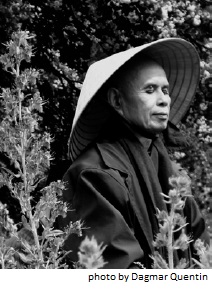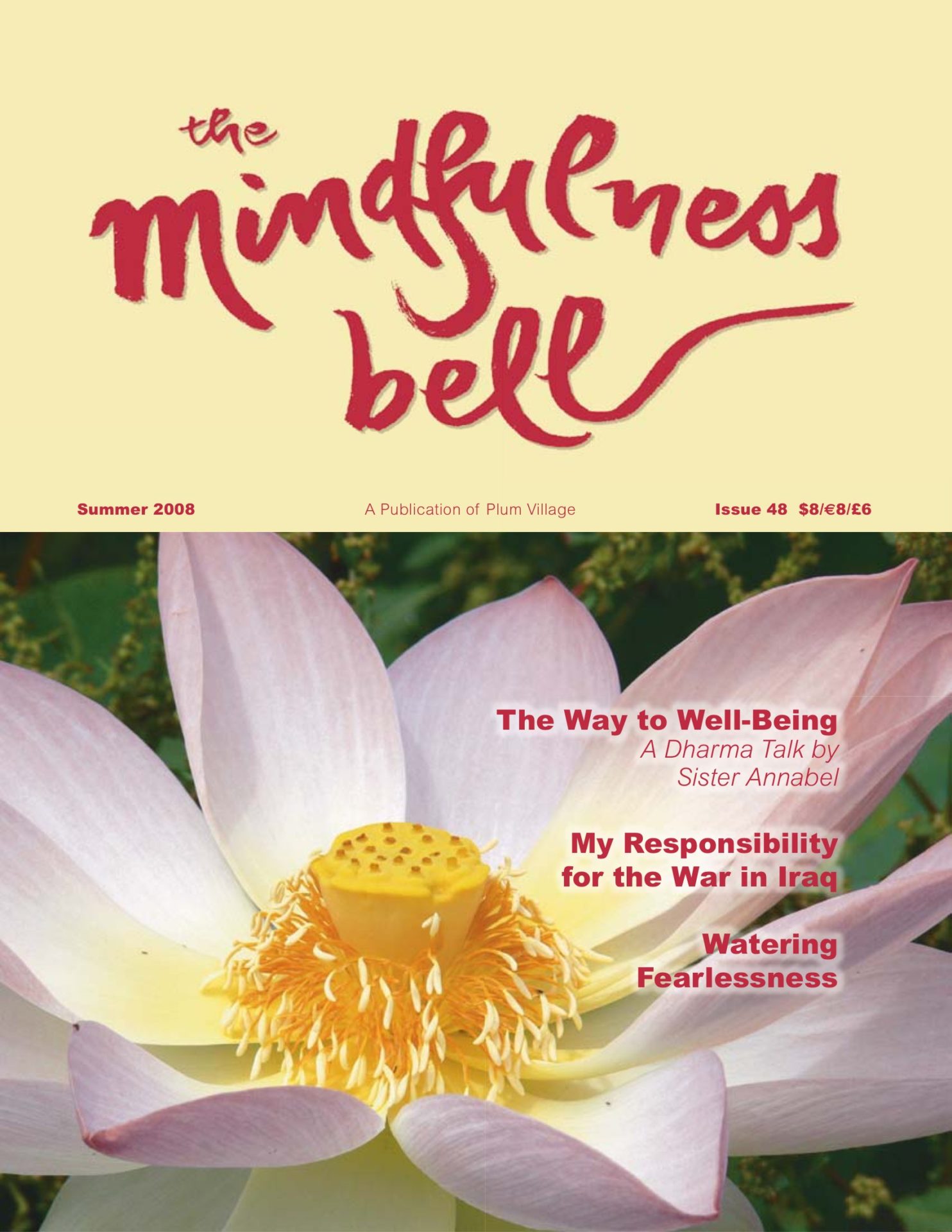By Jane Ellen Combelic in June 2008

On October 5, nearly 2000 Buddhists and psychologists gathered for a conference on Eastern and Western psychology sponsored by the University of California, Los Angeles (UCLA). Out of solidarity with the monks, nuns and people of Burma, Thich Nhat Hanh instructed his entourage of sixty monks and nuns to wear their ceremonial sanghati robes and chant the name of Avalokita,
By Jane Ellen Combelic in June 2008

On October 5, nearly 2000 Buddhists and psychologists gathered for a conference on Eastern and Western psychology sponsored by the University of California, Los Angeles (UCLA). Out of solidarity with the monks, nuns and people of Burma, Thich Nhat Hanh instructed his entourage of sixty monks and nuns to wear their ceremonial sanghati robes and chant the name of Avalokita, the bodhisattva of compassion.
Renowned vipassana teacher, author, and psychologist Dr. Jack Kornfield described the grave situation in Burma and read to the assembly the statement that had been drafted by Dr. Kornfield, Thich Nhat Hanh, and other conference leaders (see sidebar). Then, in keeping with the Buddhist tradition of council, all those in accord were asked to give their assent by standing silently. Everyone in the room arose without hesitation, including Governor Arnold Schwartzenegger and his wife Maria Shriver who were in the first rows. Thay later commented that “The conference hall was absolutely quiet, generating a powerful collective energy.”
Thay Speaks to the World
In his October 9 interview with Time Magazine in New York City, Thay lauded the courage of the Burmese monks in standing up to their government, showing the people the way to human rights and democracy. “Perhaps the most striking gesture made by his Burmese brethren before they were attacked,” wrote David Van Biema, “was the symbolic act of turning their begging bowls upside down. In a Western culture where alms-giving happens in the confines of a church or synagogue, this may have seemed odd. But Nhat Hanh pointed out that it was a powerful statement of denial to the regime leaders. ‘In Buddhist culture,’ he explained, ‘offering food to the monk symbolizes the action of goodness, and if you have no opportunity to support the practice of spirituality then you are somehow left in the realm of darkness.’ Their supreme act of condemnation: giving the regime no chance to do good. The importance of monks in Burma was also suggested, in a grisly way, by reports that hundreds of Burmese soldiers had been arrested for refusing to shoot at them.”
The monks and nuns “prove to be worthy spiritual leaders of the country,” Thay elaborated in the letter he wrote from Blue Cliff Monastery. “The world is supporting Burma, just as the world supported the struggle for human rights and freedom of the Buddhist and Vietnamese people in the 1960s under the Ngo Dinh Diem regime. It was not one Buddhist practitioner who stood up but all Buddhist practitioners stood up together at the same time. Now it is the same thing in Burma. It is not one monk that has stood up, but all the monks have stood up. This is true spiritual leadership.”
When asked about the U.S. and Iraq, Thay said, “All over the world we are also waiting for the spiritual leaders in the United States to stand up to provide that spiritual leadership, in order to end quickly the suffering and loss of lives in Iraq. Spiritual leaders should stand up simultaneously with a clear voice to help wake the people up and show them the way. When the people have a clear vision, and the people have made up their minds, then the government has no choice but to follow. The war in Vietnam ended because of the awakening of the American people at the time.”
Janelle Combelic, True Lotus Meditation, is the editor of the Mindfulness Bell.
Statement in Support of the Monks, Nuns, and People of Burma
As a conference of almost 2000 mental health professionals, we write this statement out of concern and solidarity with the monks, nuns, and people of Burma. In this time of great suffering, repression and imprisonment, we strongly support the Burmese people in a non-violent transition to democracy.
To do so, we urge the United Nations to create a robust multinational fact-finding mission to go into Burma, listen to the monks and nuns and all those involved, and tell the world what has happened and what is needed for democratic resolution.
We also urge the International Olympic Committee organizers of the Beijing Olympics to require that China, Burma's main trading partner, do the utmost to support human rights and a transition to democracy in Burma at this time.


